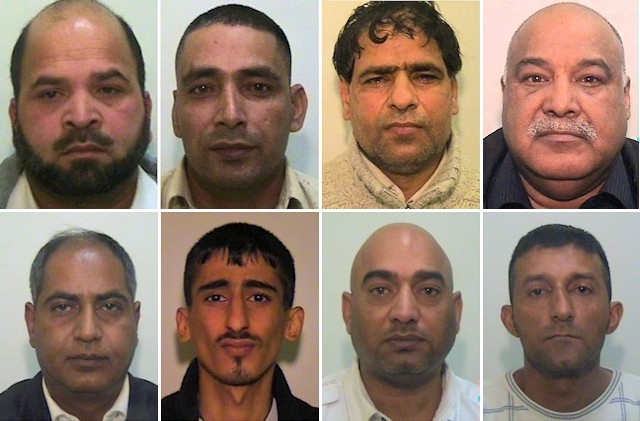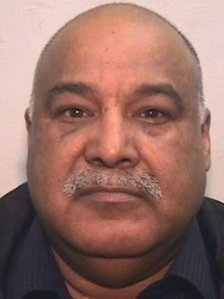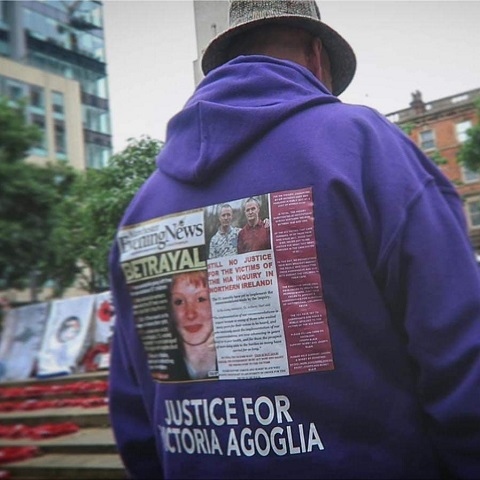Part 3 of independent review into child sexual exploitation across Greater Manchester will concentrate on Rochdale events
Date published: 12 July 2022

Rochdale, seen from Rooley Moor Road
The next part of an independent review into child sexual exploitation in Greater Manchester will focus on events in Rochdale.
The review entitled “Assuring the effectiveness of multi-agency responses to child sexual exploitation (CSE) in Greater Manchester” was originally commissioned by the Mayor of Greater Manchester, Andy Burnham, following the airing of the 2017 BBC documentary, The Betrayed Girls, about child sexual exploitation in the region.
At a press conference on Monday (20 June), Mayor Burnham said a ‘third report looking into potential failures in Rochdale will now be progressed and a publication timetable released soon.’
The findings of the first report – about Operation Augusta – were published in January 2020, and the second, commissioned by Oldham Council in 2019, into allegations of historic CSE in Oldham, published on 20 June 2022. The Oldham report looked at the way authorities have dealt with child sexual exploitation in Oldham between 2011 and 2014, and one specific case dating back to 2005.
The review is being led by child protection specialist Malcolm Newsam CBE and former senior police officer Gary Ridgway.
The next part of the report focuses on the child sexual exploitation in Rochdale between 2004 and 2012 (Operation Span), widely known as the '2012 grooming scandal' and the allegations made in 2017 by sexual health worker Sara Rowbotham and former GMP detective Maggie Oliver.
The 2012 Rochdale grooming scandal
In May 2012, nine men of Pakistani and Afghan origin were found guilty of child sex charges after targeting vulnerable girls in Rochdale and Heywood in 2008 and 2009.
All were convicted and charged at Liverpool Crown Court with offences including rape and sexual assault, conspiracy to engage in sexual activity with a child and trafficking a child within the UK.
They were all ordered to sign the Sex Offenders’ Register for life and received sentences ranging between four and 19 years in prison.
The ringleader of the grooming gang, Shabir Ahmed, 69, – known to his victims by the nickname "Daddy" – is still in prison, serving a 22-year term for rape after being found guilty of 30 child rape charges.
Ahmed had led eight others from Rochdale and Oldham in grooming young girls for sex – the victims and survivors all being, at the time, underage white British girls.
In addition to their prison sentences, all nine of the men convicted were ordered to sign the Sex Offenders' Register for life.

At the time of the scandal breaking, accusations were made that the authorities had failed to thoroughly investigate the issue amid fears of being accused of racism – indeed, Ahmed, who protested his innocence to the end, even claimed the convictions were a "conspiracy by the police" and he and the others been targeted because of their ethnicity.
Over the course of several years, the victims, who were aged between 13 and 17, were systematically raped and abused by the group. Displaying classic grooming behaviour, the men plied their young vulnerable victims with alcohol, food and money in return for sex.
On some occasions the girls were beaten if they didn't agree to have sex and on other occasiosn, they were so drunk that they didn't know what was being done to them.
The gang, most of whom knew each other, would pass some of the girls around between them and even paid some of the victims to bring them new girls.
Three of the paedophiles Abdul Aziz, Adil Khan and Qari Abdul Rauf have since lost an appeal to avoid being deported, and it was announced they would be stripped of their British citizenship. Ahmed also lost an appeal against deportation.
Despite the decision to deport them over four years ago, the paedophiles are still seemingly living in the town – much to the fury of many local residents, their victims and politicians.
In 2017, the BBC aired acclaimed three-part drama ‘Three Girls’, based on the true events, made with the full cooperation of the victims and their families: to tell the victims’ stories; how they were failed by authorities directly responsible for their protection and how the abuse impacted on their lives.
This was followed by the feature length documentary ‘The Betrayed Girls’, harrowing accounts from victims, some of whom were bravely speaking out for the first time. The documentary also featured interviews with individuals speaking out on behalf of the girls, including manager of the Rochdale Crisis Intervention Team Sara Rowbotham, former Detective Constable Maggie Oliver and Chief Prosecutor, Nazir Afzal.
The review into historic safeguarding practices in the borough of Oldham
This review looked at the way authorities have dealt with child sexual exploitation in Oldham between 2011 and 2014, and one specific case dating back to 2005.
It uncovered that the aforementioned Shabir Ahmed worked as a welfare officer in Oldham unchecked for a year – despite being accused of serious child sexual abuse.
Ahmed’s links to Oldham and the council had been investigated as part of the review, which has uncovered ‘serious failures’ in how authorities dealt with the predator.
The report has found that there was a significant allegation of child sexual abuse made to police in 2005 against Ahmed whilst he was working at Oldham Council.
This occurred three years before he was arrested in relation to the widespread grooming and gang rape in Rochdale, which also saw abused girls let down by police and social services.

The Local Democracy Reporting Service also says the review also found that a number of working Oldham taxi drivers had been accused of rape or sexual offences against children – but kept their licences.
Leaders also admitted that a belief that children in who were being groomed and sexually exploited were ‘troublesome’ lay at the heart of authorities’ failure to protect them from abuse.
An assurance review of Operation Augusta
The report considers the Operation Augusta investigation, which was launched by Greater Manchester Police (GMP) following the death of 15-year-old Victoria Agoglia.
Originally from Rochdale, Victoria was placed in the care of Manchester City Council at the age of eight, and sadly died of an overdose in 2003 after years of abuse and days after she was forcibly injected with heroin by a 50-year-old man.
Victoria's death led to the launch of Operation Augusta, a 2004 police and social services investigation into child sexual exploitation in South Manchester which identified almost 100 potential suspects and over 50 potential victims of child sexual exploitation.
Whilst the report states there is much to be commended in Operation Augusta, it found that it had not addressed the issue it was set up for: to tackle the sexual exploitation of a number of children in the care system.
Very few of the relevant perpetrators were brought to justice and neither were their activities disrupted, although there were eight criminal justice outcomes in total.
Seven were prosecutions relating to police investigations and one was an immigration outcome.
Off the back of this review, a new investigation under Operation Green Jacket has been opened by GMP, which encompasses both Victoria Agoglia’s case and those involved in Operation Augusta.
This in turn also spawned another new investigation, Operation Exmoor.
Read more: New police investigation into historic child sexual exploitationPublished: 03 November 2020

Her death lead to the launch of Operation Augusta, but the investigation was closed down in 2005 to free up resources
Whilst Victoria’s death was investigated at the time, allegations of long-standing sexual abuse that preceded her death have never been investigated and perpetrators not pursued.
The review team undertook detailed analysis of a sample of 25 children known to Operation Augusta and concluded that there was a significant possibility that 16 children were being sexually exploited.
The age of the children who were being exploited ranged from 13 to 16 with children as young as 14 reported to have ‘boyfriends’ in their mid-20s who were abusing them.
They also found that there was continued over-reliance by investigators in Operation Augusta on the co-operation of the child victims despite the obvious coercion and control exhibited by their perpetrators and that multi-agency strategy meetings focused on agencies encouraging the children to protect themselves rather than providing means of protection for them.
This was despite the 2004 Part 8 review into the death of Victoria Agoglia stating that “there should never be an expectation that vulnerable children / young people can provide protection for themselves.”
Officers conducting the initial phase of the investigation reported that there were potentially 97 persons of interest who had been identified as being involved in some way in the sexual exploitation of children as a perpetrator, facilitator or an associate of either.
The scoping report of Operation Augusta described these persons as predominantly Asian men working in the restaurant industry.
The review team independently identified 68 individuals known to Operation Augusta who it could reasonably be assumed had been a part of this group.
But instead of them being prosecuted and the victims protected, senior officers prematurely closed Operation Augusta down in 2005 before it could complete its work.
The review team’s judgement is that this was driven by a decision to remove resources from the investigation rather than a sound understanding that all lines of enquiry had been successfully completed or exhausted.
The review team concluded that they could offer no assurance that appropriate action was taken by Greater Manchester Police or the responsible local authority to address the risk in relation to 16 children in their sample including Victoria Agoglia. Fifteen of these children were the responsibility of Manchester City Council.
In respect of the remaining nine children in the sample, the review team concluded that there was insufficient available information for them to form a view as to whether the children had experienced sexual exploitation or whether these concerns were appropriately addressed.
Help and support
If you have information relating to these issues and you would like to contact someone about it or if you have been affected by these issues, please contact Greater Manchester Victim Support on 0300 303 0162. If you need support out of hours, call the Support Line on 0808 16 89 111.
Support and advice for children and young people, parents and carers, and professionals about all aspects of child sexual exploitation is available from itsnotokay.co.uk, as well as information about how to report it.
People who need support or legal advice can also get in touch with the Maggie Oliver Foundation.
Do you have a story for us?
Let us know by emailing news@rochdaleonline.co.uk
All contact will be treated in confidence.
Most Viewed News Stories
- 1Man jailed for 27 years for sex offences against a child under the age of 13
- 2Star Wars Day raises £490 for Milnrow woman's cancer treatment
- 3New children's book raises funds for Ukraine
- 4Birch Services set to receive half-a-million pound makeover
- 5Goals For Cure charity match returns to Rochdale to raise money for Joe Thompson's treatment
To contact the Rochdale Online news desk, email news@rochdaleonline.co.uk or visit our news submission page.
To get the latest news on your desktop or mobile, follow Rochdale Online on Twitter and Facebook.


